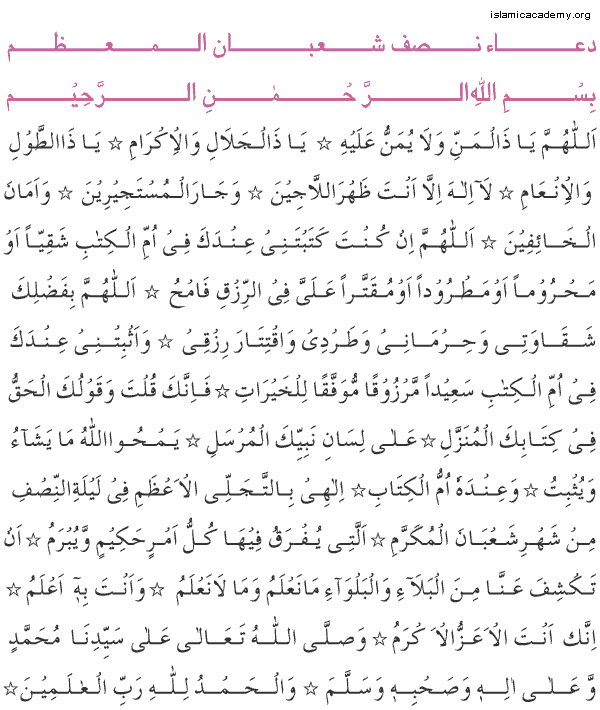What Should be Done in this Night?In order to observe the Night of Bara'ah, one should remain awakened in this night as much as he can. If someone has better opportunities, he should spend the whole night in worship and prayer. However, if one cannot do so for one reason or another, he can select a considerable portion of the night, preferably of the second half of it for this purpose, and should perform the following acts of worship:Salah - Salah is the most preferable act to be performed in this night. There is no particular number of Rak'at but preferably it should not be less than eight. It is also advisable that each part of the Salah like qiyam, rukoo' and sajdah should be longer than normal. The longest surahs of the Holy Qur'an one remembers by heart should be recited in the Salah of this night. If someone does not remember the long surahs, he can also recite several short surahs in one rak'ah.
Salaatul Tasbeeh - Is perhaps the most famous Salaat performed on auspicious nights. This is how you perform it.
 Note
Note - Incase you can't read/see/understand the above The Tasbih to be read in Salaat-Ul-Tasbeeh:
" Subhaan Allahi Wal Hamdulillahi Wa Laa ilaha illal Laahu Wallahu Akbar "
Method:
Goal is to recite above Tasbih 300 times in Four Rakah with the following method.
1. In the first rakaat, after reading Sana "Subhaana Kallahumma...", read the above tasbih 15 times.
2. Now recite Aaoz "Aoozubillah...", Bismillah "Bismillah...", Then read sura Fatiha and a Surah or minimum of three small Ayayhs
Now read the tasbih 10 times again.
3. Go to ruku saying Takbeer (Allah Hoo Akbar), after reciting "Subhaana Rabbiyal Azeem" minimum of three times. Then read the tasbih 10 times in Ruku.
4. Saying "Samee Allahu Liman Hamidah Rabbana Lakal Hamdh" get up from ruku to qiyam (standing) position.
Now read the tasbih 10 times.
5. Go to Sajdah saying Takbeer (Allah Hu Akbar) and after reciting "Subhaana Rabbiyal A'la" minimum of three times
Now read the tasbih 10 times in Sajdah.
6. Now go after first Sajdah go to Jalsa (sitting position) saying Takbeer (Allah Hoo Akbar).
Sitting in Jalsa read tasbih 10 times.
7. Go to sajda again saying Takbeer (Allah Hoo Akbar) and after reciting "Subhaana Rabbiyal A'la" minimum of three times
Now read the tasbih 10 times in Sajdah again.
8. Get up to begin 2nd rakat saying Takbeer (Allah Hu Akbar).
9. Do rakah #2 in same fashion, but before reading Bismillah "Bismillah...", and Surah Fatiha, read the tasbih 15 times. Follow the rest as you did in first Rakat.
10. After second Sajdah of Second Rakat sit in Qaidah Oola (first sitting) read Attahiyat, Durood and Dua then get up for 3rd rakaat without saying Salam.
11. Begin third Rakat, just like the first Rakat, with Sana "Subhaana Kallahumma...", read the above tasbih 15 times. Follow the rest as you did in first Rakat untill you sit for Qaidah Akihra (last sitting) after second sajdah of fourth Rakah.
In Qaidah Akihra Attahiyat, Durood, Dua finish Salah with Salam.
Special notes for Salat-Ul-Tasbih:1) Do not count loudly. It will break Salah
2) Do not count on fingers or by holding a Bead Tasbih in hand. It is Makruh.
3) You may count by pressing the fingers as a reminder. For example if you are in Ruku. You me press pinky of your right hand first for the first count, then the finger next to it for second count, then the middle finger for third count, following this method untill you reach the pinky of left hand will give you an exact count of ten. Use the same method in Qayam, Sajdah and Jalsa.
4) If missed a count then make it up in the next posture. For example if forgot to recite Tasbih after Surah in Qayam. Then you may recite Tasbish 20 times instead of 10 in Rukuh after "Subhaana Rabbiyal Azeem". Missed Tasbih cannot be recited in Qayam after ruku and Jalsa between Sajdah. If you missed the Tasbih in Ruku then recite 20 in the first Sajdah instead of the Qayam after rukuh. Similarly if missed the Tasbih in first Sajdah then do not make it up in Jalsa. Instead recite missed tasbih in the second Sajdah. If Tasbih has been missed in last sajdah of second or fourth Rakah then you can recite the missed ones before Attahiyat in Qaidah.
5) If you miss a wajib in Salah and have to do Sajdah Sahaw. You dont have to recite Tasbih in Sajdah sahoo, since the 300 count has been estalished. But if you had missed Tasbih in any of the postures and remeber it now. Then you may recite the missed Tasbih in Sajdah Sahaw now.
6) It is preferable to recite after Surah Fatiha Sura Takathuur in the first raka', Surah Wal A'sr in the second raka', Surah Kaferoon (qul ya aiyuhal Kafiroon) in the third and Surah Ikhlas (Qul hu Allah-hu ahd) in the fourth raka'. If one does not remember these surah they can recite the ones they prefer
Tilawa - The recitation of the Holy Qur'an is another form of worship, very beneficent in this night. After performing Salah, or at any other time, one should recite as much of the Holy Qur'an as he can.
 Dhikr
Dhikr - One should also perform dhikr (recitation of the name of Allah) in this night. Particularly Qalbi Zikr. (Learn about it using the links above)
One should recite Salah (durood) on Prophet Muhammad, Sall-Allahu alayhi wa sallam, as many times as one can. The dhikr can also be recited while walking, lying on bed and during other hours of work or leisure.
Dua - The best benefit one can draw from the blessings of this night is prayers and supplications. It is hoped that all the prayers in this night will be accepted by our Lord, insha-Allah. Prayer itself is an 'Ibadah, and Allah Almighty gives reward on each prayer along with the fulfillment of the supplicator's need. Even if the purpose prayed for is not achieved, one cannot be deprived of the reward of the prayer which is sometimes more precious than the mundane benefits one strives for. The prayers and supplications also strengthen one's relation with Allah Almighty, which is the main purpose of all kinds and forms of worship.
One can pray for whatever purpose he wishes. But the best supplications are the ones made by Prophet Muhammad, Sall-Allahu alayhi wa sallam. These are so comprehensive and all-encompassing prayers that all the human needs, of this world and the Hereafter, are fully covered in the eloquent expressions used in them. Actually, most of the prophetic prayers are so profound that human imagination can hardly match their greatness.
Several books in various languages are available which provide these prophetic prayers, and one should pray to Allah Almighty in accordance with them, whether by reciting their original Arabic text or by rendering their sense in one's own language.
More To Know -
One can pray for whatever purpose he wishes. But the best supplications are the ones made by Prophet Muhammad, Sall-Allahu alayhi wa sallam. These are so comprehensive and all-encompassing prayers that all the human needs, of this world and the Hereafter, are fully covered in the eloquent expressions used in them. Actually, most of the prophetic prayers are so profound that human imagination can hardly match their greatness.
Several books in various languages are available which provide these prophetic prayers, and one should pray to Allah Almighty in accordance with them, whether by reciting their original Arabic text or by rendering their sense in one's own language.
There are some people who cannot perform any additional Salah or recitations for any reason, like illness or weakness or being engaged in some other necessary activities. Such people also should not deprive themselves completely of the blessings of this night. They should observe the following acts:
To perform the Salah of Maghrib, 'Isha' and Fajr with Jama'ah in the mosque, or in their homes in case of their being sick.
They should keep reciting the dhikr, particularly the one mentioned in para
above, in whatever condition they are until they sleep.
They should pray to Allah for their forgiveness and for their other objectives. One can do so even when he is in his bed.
The women during their periods cannot perform salah, nor can they recite the Qur'an, but they can recite any dhikr, tasbeeh, durood sharif and can pray to Allah for whatever purpose they like in whatever language they wish. They can also recite the Arabic prayers mentioned in the Qur'an or in the hadith with the intention of supplication (and not with the intention of recitation).
According to a hadith, which is relatively less authentic, Prophet Muhammad, Sall-Allahu alayhi wa sallam, went in this night to the graveyard of Baqi' where he prayed for the Muslims buried there. On this basis, some of the fuqaha hold it as mustahabb (advisable) in this night to go to the graveyard of the Muslims and recite Fatihah or any other part of the Qur'an, and pray for the dead. But this act is neither obligatory nor should it be performed as regularly as an obligatory act.
 "Assalamu Alalikum Wa Rahmatullahi Wa Barakatuh,"
"Assalamu Alalikum Wa Rahmatullahi Wa Barakatuh," 




























